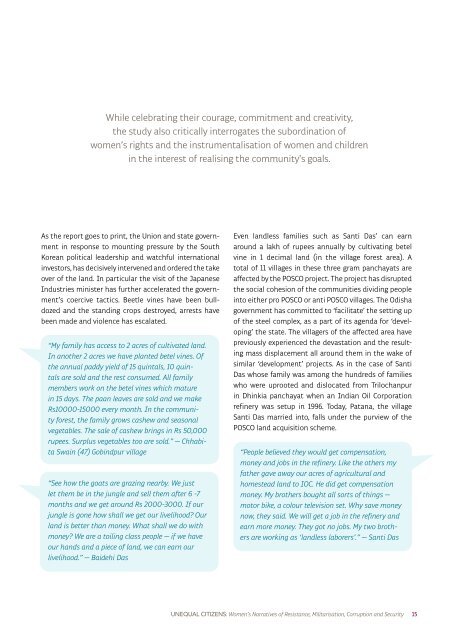CC_India
CC_India
CC_India
Create successful ePaper yourself
Turn your PDF publications into a flip-book with our unique Google optimized e-Paper software.
While celebrating their courage, commitment and creativity,<br />
the study also critically interrogates the subordination of<br />
women’s rights and the instrumentalisation of women and children<br />
in the interest of realising the community’s goals.<br />
As the report goes to print, the Union and state government<br />
in response to mounting pressure by the South<br />
Korean political leadership and watchful international<br />
investors, has decisively intervened and ordered the take<br />
over of the land. In particular the visit of the Japanese<br />
Industries minister has further accelerated the government’s<br />
coercive tactics. Beetle vines have been bulldozed<br />
and the standing crops destroyed, arrests have<br />
been made and violence has escalated.<br />
“My family has access to 2 acres of cultivated land.<br />
In another 2 acres we have planted betel vines. Of<br />
the annual paddy yield of 15 quintals, 10 quintals<br />
are sold and the rest consumed. All family<br />
members work on the betel vines which mature<br />
in 15 days. The paan leaves are sold and we make<br />
Rs10000-15000 every month. In the community<br />
forest, the family grows cashew and seasonal<br />
vegetables. The sale of cashew brings in Rs 50,000<br />
rupees. Surplus vegetables too are sold.” — Chhabita<br />
Swain (47) Gobindpur village<br />
“See how the goats are grazing nearby. We just<br />
let them be in the jungle and sell them after 6 -7<br />
months and we get around Rs 2000-3000. If our<br />
jungle is gone how shall we get our livelihood? Our<br />
land is better than money. What shall we do with<br />
money? We are a toiling class people — if we have<br />
our hands and a piece of land, we can earn our<br />
livelihood.” — Baidehi Das<br />
Even landless families such as Santi Das’ can earn<br />
around a lakh of rupees annually by cultivating betel<br />
vine in 1 decimal land (in the village forest area). A<br />
total of 11 villages in these three gram panchayats are<br />
affected by the POSCO project. The project has disrupted<br />
the social cohesion of the communities dividing people<br />
into either pro POSCO or anti POSCO villages. The Odisha<br />
government has committed to ‘facilitate’ the setting up<br />
of the steel complex, as a part of its agenda for ‘developing’<br />
the state. The villagers of the affected area have<br />
previously experienced the devastation and the resulting<br />
mass displacement all around them in the wake of<br />
similar ‘development’ projects. As in the case of Santi<br />
Das whose family was among the hundreds of families<br />
who were uprooted and dislocated from Trilochanpur<br />
in Dhinkia panchayat when an <strong>India</strong>n Oil Corporation<br />
refinery was setup in 1996. Today, Patana, the village<br />
Santi Das married into, falls under the purview of the<br />
POSCO land acquisition scheme.<br />
“People believed they would get compensation,<br />
money and jobs in the refinery. Like the others my<br />
father gave away our acres of agricultural and<br />
homestead land to IOC. He did get compensation<br />
money. My brothers bought all sorts of things —<br />
motor bike, a colour television set. Why save money<br />
now, they said. We will get a job in the refinery and<br />
earn more money. They got no jobs. My two brothers<br />
are working as ‘landless laborers’.” — Santi Das<br />
UNEQUAL CITIZENS: Women’s Narratives of Resistance, Militarisation, Corruption and Security<br />
15


